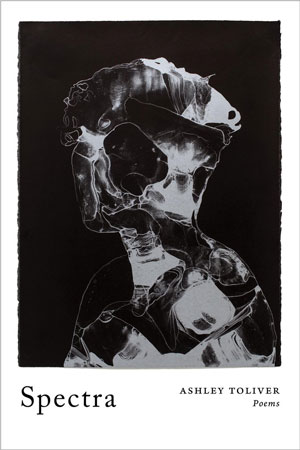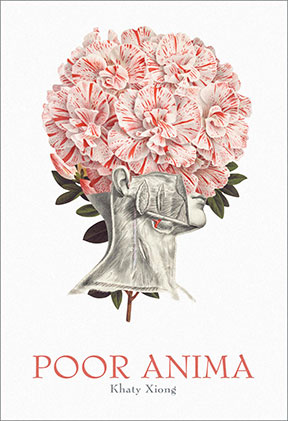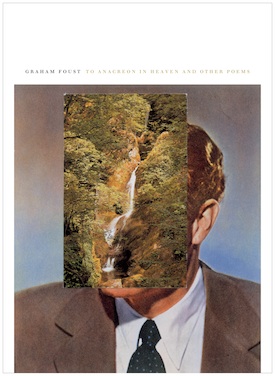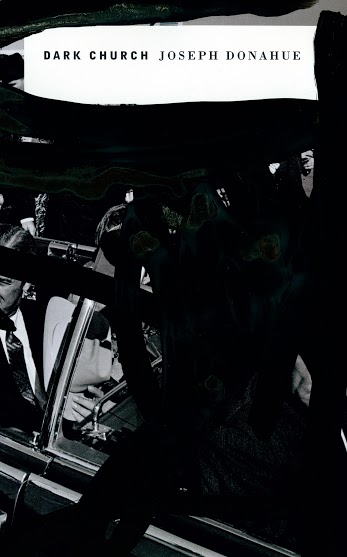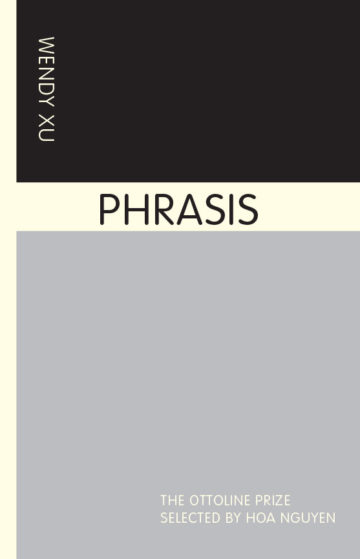Spectra by Ashley Toliver
(Coffee House Press, 2018)
Toliver moves within form as if the poem is liquid, testing where the line is supposed to go then taking the shape that’s been there all along. Water’s presence in the first section’s imagery is both comforting and menacing; I get the sense while reading that she does not blame water for its mass in the way the speaker does not blame her companion for their preoccupation with self. The speaker’s empathy encompasses a breadth—where “Inside an ordinary room our bodies flatten and spread / over the furniture like breakers catching the last of the sun” is therefore “At the end of my rope / is something shaped like tipped sails, the water rushing clean / over the hull.” Toliver’s observations of the work of emotional domesticity in the ‘Housekeeping’ series are laden with wry self-acknowledgement that reinforce how heavy and exquisite ordinary commitment can be:
Of course we can climb backward into the pulp and pull all the questions from their sharpened hangers. I’m doing it already, see me, I’m pulling all the shredded lace down, quitting in the middle of the song.
Meditations on the frailty and resilience of the body as a machine, its mystery as incubator, draw me into the second half of Spectra where the speaker engages self as other. Specifically, the sense of alienation of self from the body, of being forced to observe ourselves from outside ourselves, as one does in bodily trauma:
dear son I harvested you from this as any winter saws the youngest spruce on the plain silencer placed on the note and hummed there repressive gesture frozen around the snuffed-out kin
I waited a long time for Ashley Toliver’s Spectra. As we discussed editing, cover choices, and Toliver’s meticulous writing process, it became clear to me how much I admire her precision. She does what I, in my haste to rid myself of discomfort, am unwilling (or at least resistant) to do—wait. This book, for me, embodies the tenderness with which we can, inside and above our own vulnerabilities and flaws, choose to observe our inevitable corporeal selves.
Poor Anima by Khaty Xiong
(Apogee Press, 2015)
It is impossible to write about Xiong without talking about the delicate intimacy she weaves between the living body and the presence of the dead. The query of what life means, to witness fresh birth in nature and ourselves while still in a roving and unpredictable state of grief. The shock of remembering what is gone:
because someone said so & our bodies believe it so ouroboros of home- lessness this dress used & making
Poor Anima, Xiong’s first collection, is restless in its seeking of home, with family always in the background, her Hmong heritage seen here resisting an historical erasure. Home, of course, is land; but it is also—for Xiong—family, the mother, and the spirit of the mother that lives on without the body. What pulls me to her writing is how pragmatically she speaks of the occurrence of mystery, as if it is simply the leg of the table in the kitchen, without diminishing the encounter itself, “If haunting is strength, then it keeps us chaste— // I don’t keep in touch with the dead, but they always remind you of you, / filling up towns, giving persons new ways to study light.” At times there is a dreaminess about the delivery as it touches the ethereal, caution preventing the wilting of the touched petal, and at others a visceral grasp on the vital source of the observed. Revelation of the self as inhabited body, the wonder of it, is throughout the book, never shying from what we see in the company of mystery: “the bite, the bright red meat, all this and chewed. / Tasting again and plucking again and the last eggs.” What seems contradictory—surrender to grief and the reclamation of joy—a symbiotic cycle and balance within Xiong’s gaze.
The first time I heard Khaty read from this collection, I sat still in my chair and held my breath. As time has passed, new work has been introduced and that feeling hasn’t changed for me—I don’t want to miss anything she may offer.
To Anacreon in Heaven and Other Poems by Graham Foust
(Flood Editions, 2016)
Sometimes reading poetry contains the exhilarating enjoyment of watching the writer’s brain clicking along, tipping scales one direction, flowing over the edge in another, like an animated diagram of a Rube Goldberg machine. Pick just about any Graham Foust, and that’s what I get out of it at minimum. At maximum, though, is a guided, if branching, journey through the observations of the absurdity of life in human bodies and the catch in the throat during brief flashes of peeking through—that sublime moment of release from the self before the tether snaps back. In Anacreon, Foust knows human connection is the necessary crux and yet the speaker struggles with how tenuous that connection can be: “I think I’d live there if I could, and when I’m there I think of you. / Thanks to me we’re lost in unison. / Thanks to you I can move without meaning to. / If I could, I’d sing everything you sing to me to you.” This is a different self-knowing than in the Toliver, with a cutting edge when the speaker addresses himself as if referencing past acrimony: “You take your own shapes every time you lie down, rise in segments / like some idiot mime. // It’s not entirely correct to say that August is like having blood / dumped on you, but let’s, until we conjure something else.” As in other projects I’m drawn to, Foust employs the long poem with short sections containing self-referential phrases and concepts. “They’re lowering me into me. / This is where I came in.” Particularly engaging for me is the examination of the self outside of the self, the consciousness hovering just above and within view, tethered and desiring escape. “The shortest distance between two ideas is fear; the shortest dis- / tance between three ideas is pain.” And just when I begin to think I’m being self-indulgent in the drilling down, Foust reminds me of what has value, what there is to remain present for:
The last of the last of the rain will never make the gray trees.
I find my panicky kid in the garage, and I tell him, “That’s just your
other heart—I didn’t mean to build it.”Same boy says, “Look at these scissors.”
You understand that he says this by throwing them.
What matters most is our ability to lay ourselves bare. Whether it serves the purpose we wish is up for debate.
Dark Church by Joseph Donahue
(Verge Books, 2015)
Last term I wrote at length about a poem in this book, a staggering long piece titled “Ararat,” where themes of paradox and reconciliation thread through a retelling of the Noah narrative. Discovering Dark Church, an installment in Donahue’s ongoing Terra Lucida project, has been a great and necessary joy this year. Often, strict adherence to form within modern poetry, for me, can be more distracting than edifying of the work, but Donahue uses form and meter to create rhythm that permeates and softly carries the reading in a way that allows me to forget he’s writing with purposeful constraint. Likewise, when religion is centered thematically, my personal biases can cause me such frustration that I begin to hunt for authorial intent and miss what’s in front of my face. Such is the generosity and subtle intellectual tapestry of Dark Church that I am unaware of being drawn into communion with Gnostic query until it is too late, and I have been won over. This book is relentless and difficult to quote in short form as the work is meant to be read in long, continuous flow, each building on the next, references sowing forward and tying backward:
And if the birds in Gethsemane
do not remember inthe depth of night the day
perhaps in its blaze,they lose the slow
swallowing of the seen,forget the hours when wings
are only a cloak against the cold,after the hour of nightfall,
in the hour of stillnesswhen they see the world
go away and cannot conceivewhat song is
Full of an almost liturgical call and response, with an eye always on the physical experience of living in this body, on this earth, at this time, and yet with a yearning toward awe, toward the mystical:
at the sinking of
the last landmarkstrees, hills, mountains
monuments, shining wallson top of mountains
at the purifying of the skyat the craving of the birds
for the end of the effort at flightfor the last of the notes of their songs
to be lost in the stormy windand the bodies of livestock
the carcasses of petsbequeathing themselves
to the zeal of the spirit
Donahue isn’t solely focused on Biblical narrative, though, and the broad scope of the topics in Dark Church include an Irish Catholic upbringing in Dallas during the Kennedy era—his treatment of which is gorgeous and startling. The tenderness present in the speaker’s obvious love of what surrounds us, the awe inherent in the drive to query, the steadfast embrace of an unknowing, all extend a disarmingly genuine invitation to conversation with the reader that I find irresistible.
Phrasis by Wendy Xu
(Fence Books, 2017)
Maybe it was that I went on an Objectivist tear this winter, but opening Phrasis right then was an instructive experience for me. The book illustrates quite clearly how a poem, or a serial/sectioned piece, can itself be a built object of experience. This theory became foundational for where I’m heading in my writing, and the catalyst for that illumination came by way of Xu’s candid speech in Phrasis,
As an object does, perhaps turning
in place, fixed orbit satisfies
my aesthetic needOff-stage a roaring fire
Shafts of light gesture in separate directionsbetween the hole where
I emerge and where I never get
any sleep, just a few feet
The “I” of the speaker is present and engaging with a recognizable world, and yet there’s a skepticism permeating the language, “Preemptive necessity is a phrase I’d like to unframe, / people do plunder each other, teethed, telling you / what you are.” As bleak as that may sound, Xu is also committing the radical act of visibly fashioning a vulnerability, an art object we can commune with if we choose “Trading indeed / in likenesses the ugly work I laid / my cheek down upon the mattress, how to do / the next part / bristling undone.” This work is electrically political, speaking with clear agency about gender, race, and class issues, engaging with a kindness that belies the speaker’s skeptical criticism of consumer culture, moving from “slowing, I can again regard / your sentences / in public. This thought that lodges: venture capitalists / of America, kill yourselves” to
A root’s bitterness is edged out, sweetened the pot, I
am telling you I speak from the representative we but
do not fill me inWomen did not say color is its own autonomous expression
of feeling not bounded to the object, the expression of
the object
Shadow, contrast, and color structure the book in a way that brings to mind the light displays of Yamashita or Turrell, creating the feeling that the poems themselves are cast in certain hues—bathed in green, purple, ochre. It’s not just that colors themselves are named but that some of the pieces seem to radiate a tinted glow, somehow, like “Here it is again smearing its light to bluer, your light.” Instead of any sort of didactic conclusions, Phrasis presents again and again the corporeal experience, in hues that allow me to step outside of me for a few valuable moments.
